Released in March of this year, the Synology DiskStation DS216j is touted as the more affordable model of the DS216 line (which includes the DS216play and DS216se). Even though this is considered a more budget-oriented model, this 2-bay DiskStation still features a dual-core CPU with a hardware encryption engine, the latter which helps diverts encryption calculation tasks away from the main CPU for optimized efficiency. Synology has specifically designed the DS216j for home users with looking for an effective storage solution that focuses on multimedia streaming as well as seamless file management and synchronization.
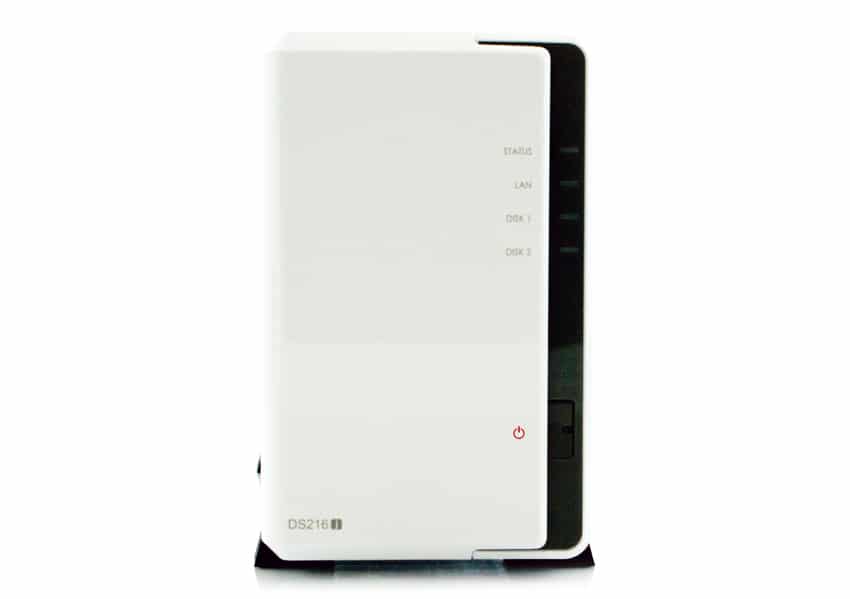
Synology quotes the DS216j with average read and write performance of 112.75 MB/s and 97.6 MB/s, respectively, when configured in RAID1 using a Windows environment. In addition, the DS216j features a built-in floating-point unit to improve the overall performance of the main CPU, such as with large file transfers, thumbnail processing, and photo browsing. It also helps with the on-demand transcoding of audio tracks into MP3s to reduce streaming bandwidth. The DS216j is equipped with two USB 3.0 ports on the back panel of the NAS, allowing users to connect external storage devices for supplemental storage if they need it.
The DS216j also supports Cloud Station, giving users the option to sync their files with other DiskStations and on their local computer drives (Windows, Mac and Linux) as well as iOS, Android, Windows mobile devices. Users can also sync with Amazon S3, Amazon Glacier, Microsoft Azure, SFR, and hicloud.
Backed by a 2-year warranty, the Synology DiskStation DS216j goes for roughly $170 (diskless).
Synology DiskStation DS216j Specifications
- CPU Model: Marvell Armada 385 88F6820
- CPU Architecture: 32-bit
- CPU Frequency: Dual Core 1.0 GHz
- Floating Point
- Hardware Encryption Engine
- System Memory: 512 MB DDR3
- Storage
- Drive Bay(s): 2
- Compatible Drive Type:
- 3.5″ SATA III / SATA II HDD
- 2.5″ SATA III / SATA II HDD (with optional 2.5″ Disk Holder)
- 2.5” SATA III / SATA II SSD (with optional 2.5″ Disk Holder)
- Maximum Internal Raw Capacity: 16 TB (8 TB HDD x 2) (Capacity may vary by RAID types)
- Maximum Single Volume Size: 16 TB
- External USB 3.0 Ports: 2
- File System
- Internal Drives: EXT4
- External Drives:
- EXT4
- EXT3
- FAT
- NTFS
- HFS+ (Read Only, with max. volume size 2TB)
- Appearance:
- Size (Height x Width x Depth): 165 mm x 100 mm x 225.5 mm
- Weight: 0.88 kg
- RJ-45 1GbE LAN Port: 1
- Wake on LAN/WAN
- System Fan: 92 mm x 92 mm x 1 pcs
- Fan Speed Modes:
- Cool Mode
- Quiet Mode
- Low-power Mode
- Wireless Support (dongle)
- Brightness adjustable front LED indicators
- Power Recovery
- Noise Level: 18.2 dB(A)
- Scheduled Power On/Off
- Power Supply Unit / Adapter: 60W
- AC Input Power Voltage: 100V to 240V AC
- Power Frequency: 50/60 Hz, Single Phase
- Power Consumption:
- 14.85 W (Access)
- 6.95 W (HDD Hibernation)
- Environment Temperature
- Operating Temperature: 5°C to 40°C (40°F to 104°F)
- Storage Temperature: -20°C to 60°C (-5°F to 140°F)
- Relative Humidity: 5% to 95% RH
- Storage Management
- Maximum Internal Volume Number: 256
- Maximum iSCSI Target Number: 10
- Maximum iSCSI LUN: 10
- Supported RAID Type :
- Synology Hybrid RAID
- Basic
- JBOD
- RAID 0
- RAID 1
- RAID Migration: Basic to RAID 1
- Volume Expansion with Larger HDDs:
- Synology Hybrid RAID
- RAID 1
- Volume Expansion by Adding a HDD Synology Hybrid RAID
- Warranty: 2 Years
Design and build
The DS216j looks virtually identical to the “se” model, which is fairly barebones compared to the DS216 and DS216play. That being said, the “j” still features Synology’s solid, slick build that we come to expect from the company. Comprised of a white plastic enclosure, its compact size also allows the DiskStation to be placed anywhere around a workstation without taking up too much space.
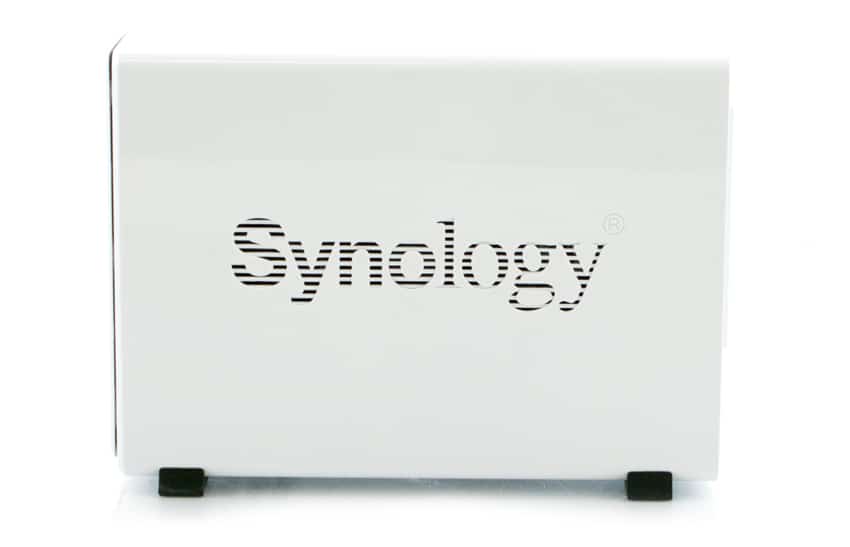
The front of the NAS shows the model number in the lower left hand side with a power button and four LED indicator lights on the right-hand side. These LED indicators can be adjusted to four different levels of brightness, which can also be scheduled to change according to the time of day.
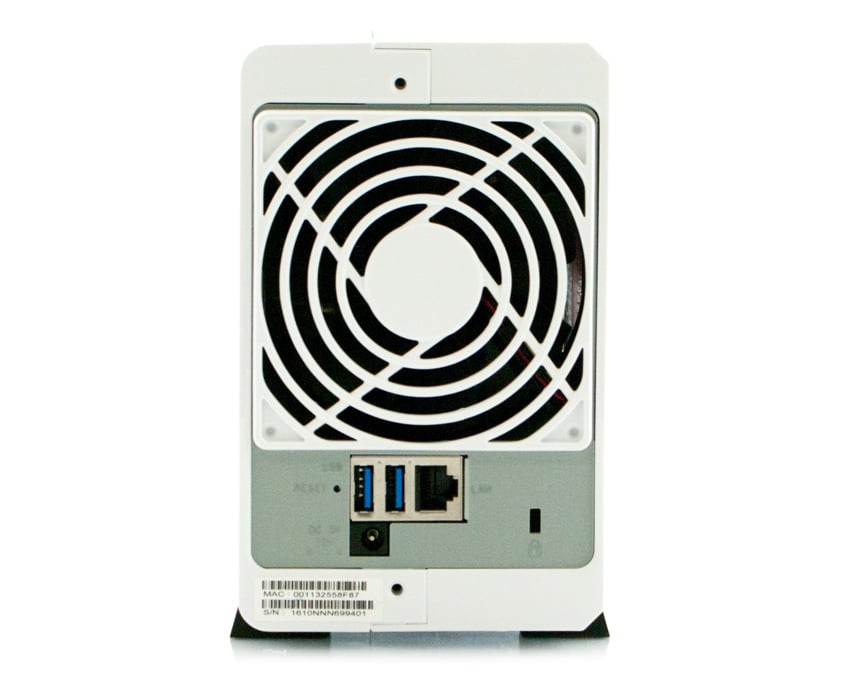
On the back panel, the fan takes up most real estate. Also located at the rear is a recessed reset button, two USB 3.0 ports, and a LAN port. Below these ports are the power supply input and Kensington lock.
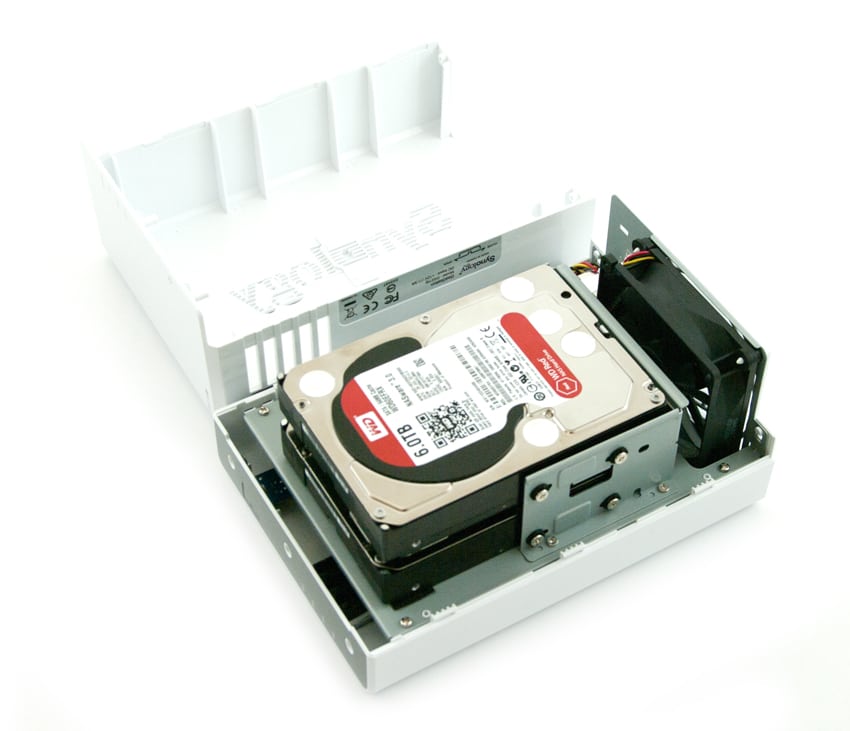
Because the DS216j doesn’t feature drive trays, users will have to slide the left side of the device forward in order to access, remove, and install the HDDs. Once the cover has been removed, you will see four screws in each drive, which hold them in place.
Testing Background and Comparables
We publish an inventory of our lab environment, an overview of the lab’s networking capabilities, and other details about our testing protocols so that administrators and those responsible for equipment acquisition can fairly gauge the conditions under which we have achieved the published results. To maintain our independence, none of our reviews are paid for or managed by the manufacturer of equipment we are testing.
For this review, our enterprise synthetic benchmarks will look at the DS216j populated with two 6TB WD Red HDDs. The synthetic benchmarks will examine the performance for CIFS and iSCSI protocols and will be compared to the Synology DS216play, DS216, and the DS216se.
Enterprise Synthetic Workload Analysis
Prior to initiating each of the fio synthetic benchmarks, our lab preconditions the device into steady state under a heavy load of 16 threads with an outstanding queue of 16 per thread. Then the storage is tested in set intervals with multiple thread/queue depth profiles to show performance under light and heavy usage.
Preconditioning and Primary Steady-State Tests:
- Throughput (Read+Write IOPS Aggregated)
- Average Latency (Read+Write Latency Averaged Together)
- Max Latency (Peak Read or Write Latency)
- Latency Standard Deviation (Read+Write Standard Deviation Averaged Together)
This synthetic analysis incorporates four profiles, which are widely used in manufacturer specifications and benchmarks:
- 4k
- 100% Read or 100% Write
- 100% 4k
- 8k (Sequential)
- 100% Read and 100% Write
- 100% 8k
- 8k 70/30
- 70% Read, 30% Write
- 100% 8k
- 128k (Sequential)
- 100% Read or 100% Write
- 100% 128k
In our enterprise workload, we measured a long sample of random 4k performance with 100% write and 100% read activity, which is how we attained our main results. Looking at throughput, the DS216j posted its best write results when using CIFS with 307 IOPS, while reaching 255 IOPS in reads when using the block-level iSCSI.
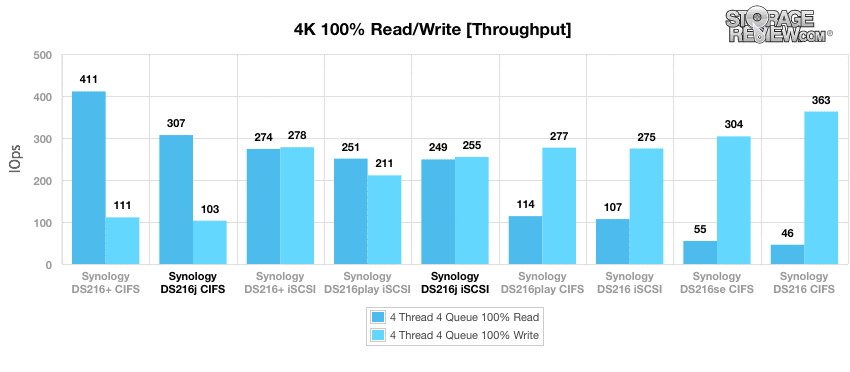
In average latency, the DS216j fared much better in read activity using iSCSI block-level connectivity with 1,003.01ms in reads (1,023.94ms writes). In CIFS, DS216j’s write performance was much better, posting 832.9ms.
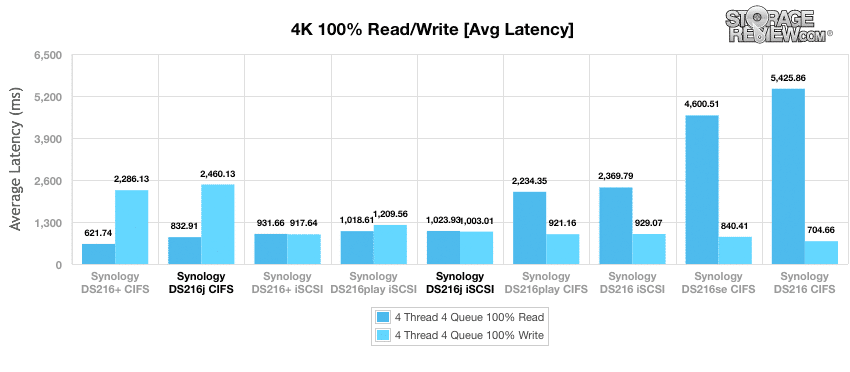
The DS216j recorded its best max-latency read activity in iSCSI with 2,719ms (which was good enough for top performance among the 2-bay comparables) while writes hit 2,667.5ms. In CIFS, the DS216j showed double the read latency at 5,193ms, though it’s write latency was 27,615ms.
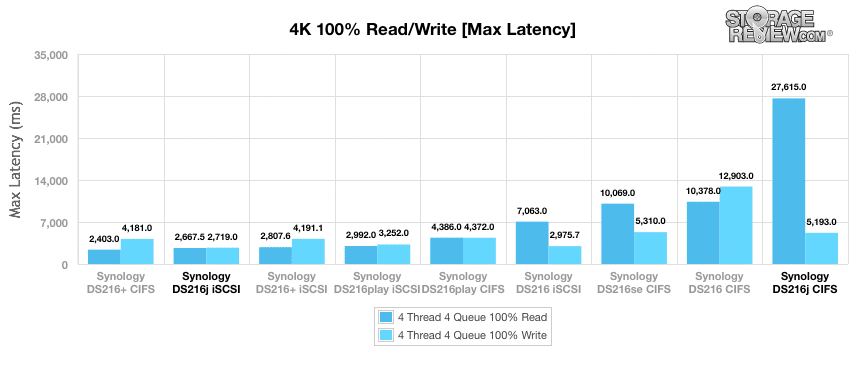
When looking at standard deviation, the DS216j showed some pretty good read latency in CIFS, posting just 191.23ms; however its 2,613.47ms write activity was the highest by a large margin. During our iSCSI test, the DS216j recorded 564.85ms read and 696.69ms write.
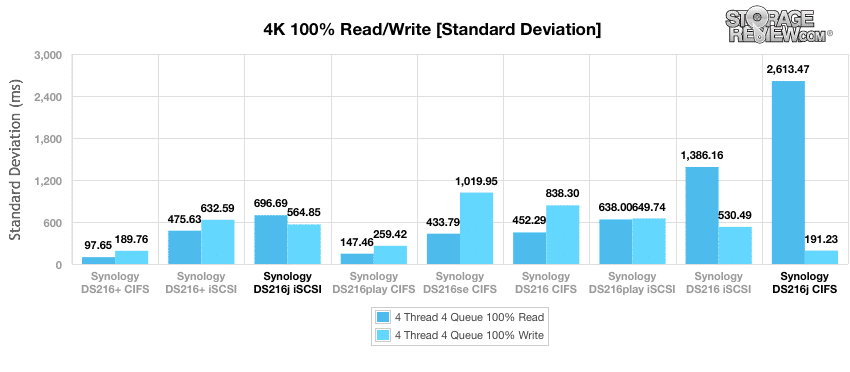
The next benchmark looks at 100% 8K sequential throughput with a 16T/16Q load in 100% read and 100% write operations. Again, the DS216j CIFS posted its best read performance with 9,012 IOPS (and 5,470 IOPS write) while the block-level iSCSI test showed its best write performance with 7,177 IOPS (and 1,171 IOPS read). The top performing Synology 2-bay NAS was Synology DS216+ CIFS with an impressive 14,244 IOPS read.
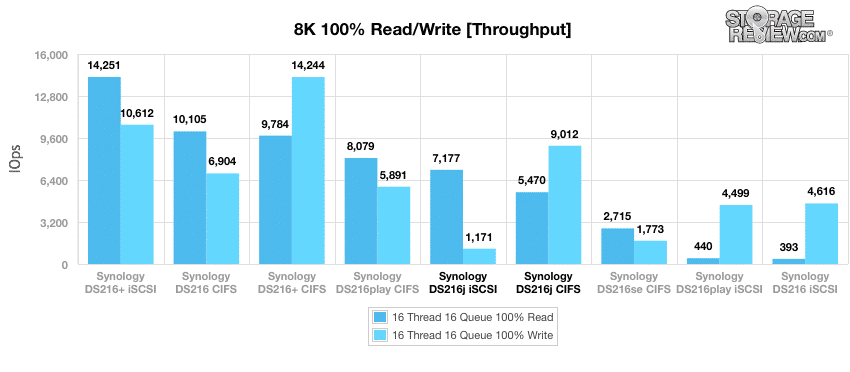
Compared to the fixed 16 thread, 16 queue max workload we performed in the 100% 4k write test, our mixed workload profiles scale the performance across a wide range of thread/queue combinations. Looking at throughput, the DS216j iSCSI recorded the best overall results among all the Synology DS216 models, posting an impressive range of 224 IOPS to 254 IOPS.
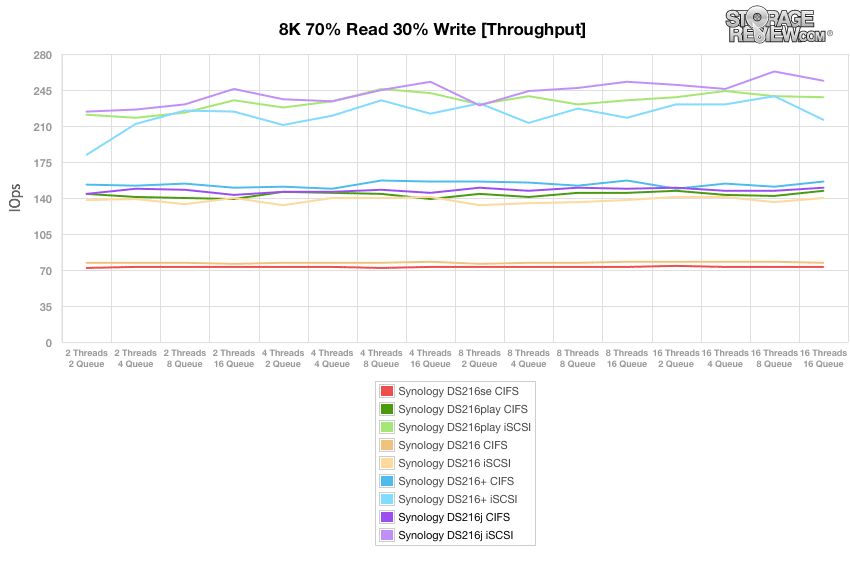
In average latency of the same test, the DS216j iSCSI again had the best overall results with just 17.73ms at 2T/2Q and 1,005.08ms in the terminal queue depths.
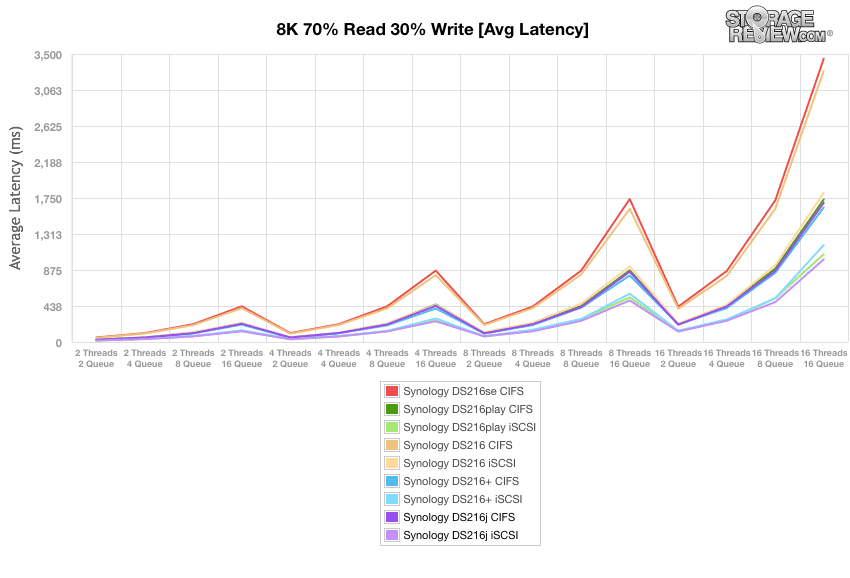
Maximum latency told a similar story, as the DS216j iSCSI placed at the top of the leaderboard with a range of 796.85ms to 3,046.78ms. Leveraging CIFS, maximum latency performance was noticeably higher at 1,264.44ms (2T/2Q) and 4,758.84ms (16T/16Q).
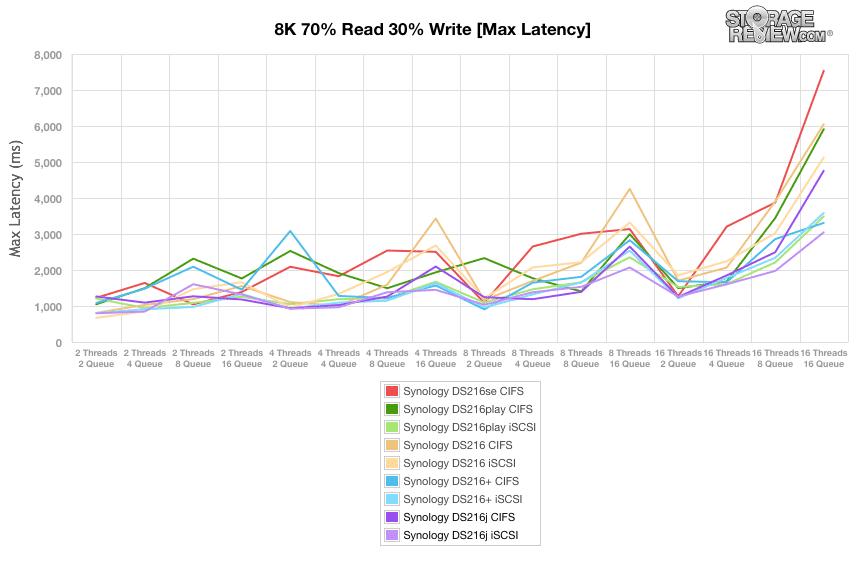
Looking at standard deviation, the DS216j iSCSI fell slightly behind the other tested DS216 models, as it posted a range of 28.91ms to 576.69ms. Our file-level CIFS test showed better overall results for the DS216j, with a standard deviation range of 32.52ms to 439.47ms.
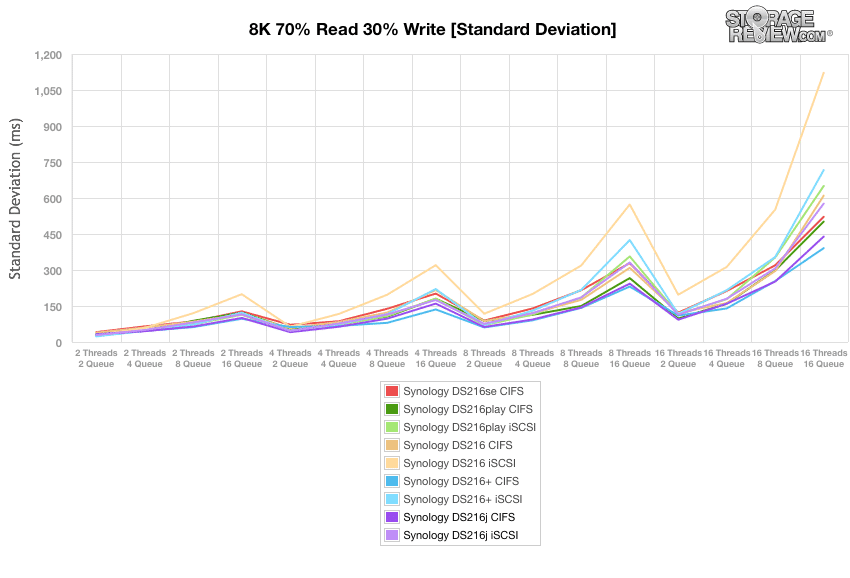
The last test in our Enterprise Synthetic Workload testing is the 128k test, which is a large block sequential test that shows the highest sequential transfer speed for a platter drive. Looking at the 128k performance of 100% write and 100% read activity, Synology DS216j CIFS placed at the top of the leaderboard once again, with 107MB/s write and 115MB/s read. In iSCSI, the DS216j reached 112MB/s write; however, it only posted 27MB/s in reads.
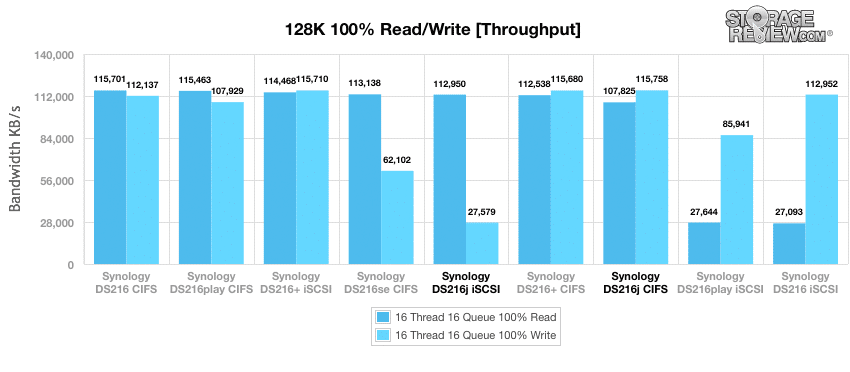
Conclusion
The Synology DS216j is a great option for home users looking for a media storage hub. Though not as powerful as some of the other DS216 models, the “j” offers a simple, yet powerful, solution to share and manage files as well as great multimedia streaming and file synchronization abilities. The Synology NAS comes with a dual core 1.0 GHz processor, 512MB of DDR3DDR3 RAM, two USB 3.0 ports, and up to a hefty 16TB in raw capacity. The DS216j’s price tag will also be very appealing to most consumers, as the 2-bay NAS goes for roughly $169 (diskless model), which is about $100 dollars less than the DS216 and DS216play.
To test its performance, we leveraged both iSCSI block-level and CIFS file-level connection technologies and compared it to other models from the same 2-bay family. First, we looked at its 4K throughput performance, where the DS216j showed middle-of-the-run numbers with 307 IOPS in writes (CIFS) and 255 IOPS in reads. Results were more or less the same in average latency, as the DS216j posted 1,003.01ms in reads and 832.9ms in writes using iSCSI and CIFS respectively.
Though it had mediocre results during our 4K benchmarks, the DS216j performed well in our 8k 70/30 workload profile, which scale the load across a wide range of thread/queue combinations. For throughput, the DS216j iSCSI came in with a range of 224 IOPS to 254 IOPS while average latency showed 17.73ms at 2T/2Q and 1,005.08ms in the terminal queue depths. Maximum latency did well against comparables, as the DS216j iSCSI posted a range of 796.85ms to 3,046.78ms.
Our final test looked at its sequential 128k performance of 100% write and 100% read activity. Here, we saw the DS216j excel against others in its product family with 107MB/s write and 115MB/s read using CIFS. In iSCSI however, the DS216j reached just 112MB/s write and 27MB/s in read activity.
Pros
- Good SOHO performance at a low entry price
- Fantastic file management and multimedia features
Cons
- Lacks slot loading drive bays
- Lower iSCSI write performance
Bottom Line
The Synology DS216j is solid entry addition to their 2-bay NAS line, providing home users with strong performance and easy-to-use (yet powerful) file management and multimedia streaming features.




 Amazon
Amazon